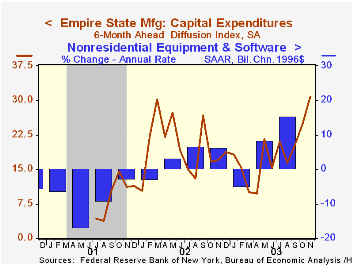 Global| Nov 17 2003
Global| Nov 17 2003Empire State Index Surged Again
by:Tom Moeller
|in:Economy in Brief
Summary
The Empire State Index of General Business Conditions for November surged even further to 41.01 following a jump in October to a record 34.11 (revised upward). Consensus expectations had been for a decline this month to 30.0. New [...]

The Empire State Index of General Business Conditions for November surged even further to 41.01 following a jump in October to a record 34.11 (revised upward). Consensus expectations had been for a decline this month to 30.0.
New orders (41.37) were notably strong as were shipments (37.6). Both indexes rose sharply to new records in November. Employment (10.26) eased slightly m/m but the latest level was the second highest on record.
The index of prices paid rose slightly to 9.40 and continued the firming trend of the last five months.
The survey includes measures of expectations for business conditions six months ahead. The November index rose to a new high of 67.00 as expectations for capital expenditures improved further, also to a new record level.
The Empire State Manufacturing Survey is a monthly survey of manufacturers in New York State conducted by the Federal Reserve Bank of New York. Participants from across the state in a variety of industries respond to a questionnaire and report the change in a variety of indicators from the previous month. Respondents also state the likely direction of these same indicators six months ahead. April 2002 is the first report, although survey data date back to July 2001.
Like the Philadelphia Fed Index of General Business Conditions, the Empire State Business Conditions Index reflects answers to an independent survey question, not the components.
For more on the Empire State Manufacturing Survey, including methodologies and the latest report, click here.
| Empire State Manufacturing Survey | Nov | Oct | Y/Y (11/02) | 2002 | 2001 |
|---|---|---|---|---|---|
| General Business Conditions (diffusion index) | 41.01 | 34.11 | 9.91 | 7.10 | -13.02 |
by Tom Moeller November 17, 2003

Total business inventories rose an unexpected 0.3% in September, the first monthly increase since March. Consensus expectations were for no change.
Retail inventories rebounded 1.0% following the 0.7% plunge in August. Excluding autos, retail inventories surged 0.8% (2.7% y/y), the most for any month since May 2000.
This jump was led by a 2.1% (9.5% y/y) spike in the building materials category and a 1.0% (2.1% y/y) recovery in inventories at general merchandise stores following several months of decline.
Retail inventories of motor vehicles and parts gained back 1.5% (9.5% y/y) versus the 2.1% August drop. According to the Federal Reserve, the gain was accomplished as output of motor vehicles rose 6.5% in September.
Overall business sales surged 0.6% (4.6% y/y) led by a 1.4% (3.1% y/y) jump in factory shipments which primarily reflected a 6.2% jump in shipments of transportation equipment.
The inventory-to-sales ratio was stable for the third month at the record low level of 1.36.
A report titled "Inventory Dynamics and Business Cycles: What Has Changed?" from economists at The Federal Reserve Board can be found here.
| Business Inventories | Sept | Aug | Y/Y | 2002 | 2001 | 2000 |
|---|---|---|---|---|---|---|
| Total | 0.3% | -0.4% | 1.6% | 2.1% | -4.7% | 5.1% |
| Retail | 1.0% | -0.7% | 5.0% | 7.6% | -2.9% | 6.0% |
| Retail excl. Autos | 0.8% | 0.1% | 2.7% | 2.5% | -1.2% | 3.7% |
| Wholesale | 0.4% | -0.1% | 0.9% | 0.4% | -4.9% | 6.1% |
| Manufacturing | -0.4% | -0.3% | -1.3% | -1.8% | -6.1% | 3.8% |
Tom Moeller
AuthorMore in Author Profile »Prior to joining Haver Analytics in 2000, Mr. Moeller worked as the Economist at Chancellor Capital Management from 1985 to 1999. There, he developed comprehensive economic forecasts and interpreted economic data for equity and fixed income portfolio managers. Also at Chancellor, Mr. Moeller worked as an equity analyst and was responsible for researching and rating companies in the economically sensitive automobile and housing industries for investment in Chancellor’s equity portfolio. Prior to joining Chancellor, Mr. Moeller was an Economist at Citibank from 1979 to 1984. He also analyzed pricing behavior in the metals industry for the Council on Wage and Price Stability in Washington, D.C. In 1999, Mr. Moeller received the award for most accurate forecast from the Forecasters' Club of New York. From 1990 to 1992 he was President of the New York Association for Business Economists. Mr. Moeller earned an M.B.A. in Finance from Fordham University, where he graduated in 1987. He holds a Bachelor of Arts in Economics from George Washington University.
More Economy in Brief
 Global| Feb 05 2026
Global| Feb 05 2026Charts of the Week: Balanced Policy, Resilient Data and AI Narratives
by:Andrew Cates






